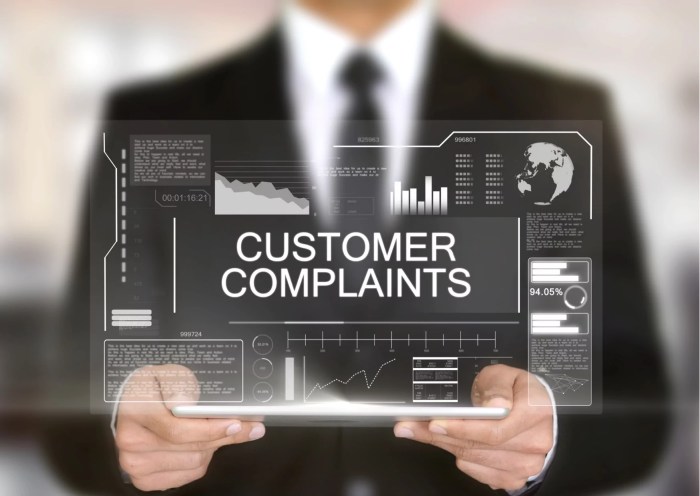Managing Customer Complaints is the key to unlocking customer loyalty and maintaining a stellar reputation. Get ready to dive into the world of effective complaint handling with tips, strategies, and real-life examples.
Importance of Managing Customer Complaints
Customer complaints are not just negative feedback; they are valuable opportunities for businesses to improve their products and services. By effectively managing customer complaints, businesses can show that they care about their customers’ experiences and are willing to take the necessary steps to address any issues. This can lead to increased customer loyalty and satisfaction, as customers are more likely to continue doing business with a company that values their feedback.
Building Customer Loyalty
- Responding promptly and professionally to customer complaints can turn dissatisfied customers into loyal advocates for your brand.
- Offering solutions or compensation to resolve complaints can demonstrate your commitment to customer satisfaction.
- By listening to customer feedback and implementing necessary changes, businesses can improve their products and services, leading to a better overall customer experience.
Impact on Company Reputation
- Unresolved complaints can damage a company’s reputation, as unhappy customers are more likely to share their negative experiences with others.
- Ignoring or mishandling complaints can lead to a loss of trust and credibility among customers, potentially resulting in a decrease in sales and customer retention.
- On the other hand, effectively managing complaints can showcase a company’s dedication to customer service and willingness to address issues, enhancing its reputation in the eyes of customers.
Strategies for Handling Customer Complaints
Effective management of customer complaints is crucial for maintaining a positive reputation and building customer loyalty. It is essential to have a structured approach to address customer concerns promptly and effectively.
Steps in Effectively Managing Customer Complaints
- Listen actively to the customer’s complaint without interrupting. Let them express their concerns fully.
- Acknowledge the issue and apologize for any inconvenience caused. Show empathy towards the customer’s situation.
- Investigate the complaint thoroughly to understand the root cause of the problem. Gather all relevant information.
- Propose a solution to the customer based on the investigation findings. Offer alternatives if necessary.
- Follow up with the customer after the resolution to ensure they are satisfied with the outcome.
Tips on Empathizing with Customers during Complaint Resolution
- Put yourself in the customer’s shoes and try to understand their perspective.
- Use phrases like “I understand how frustrating this must be” to show empathy.
- Show genuine concern for the customer’s feelings and assure them that their complaint is being taken seriously.
- Avoid being defensive or confrontational, and remain calm and composed throughout the interaction.
Importance of Active Listening in Resolving Customer Issues
- Active listening involves fully concentrating, understanding, responding, and remembering what is being said by the customer.
- By actively listening to customers, you can gain valuable insights into their concerns and preferences.
- It helps in building rapport with the customer and demonstrating that their feedback is important to you.
- Active listening can lead to quicker resolution of complaints and a higher level of customer satisfaction.
Utilizing Technology for Customer Complaint Management

In today’s digital age, businesses have the opportunity to leverage technology to streamline their customer complaint management process. By utilizing the right tools and software, companies can efficiently handle and track customer complaints, leading to improved customer satisfaction and loyalty.
Benefits of Using CRM Systems
- Centralized Data: CRM systems allow businesses to store all customer complaints in one centralized platform, making it easier to access and track each case.
- Improved Communication: With CRM systems, employees can easily communicate with customers, update them on the status of their complaints, and provide timely resolutions.
- Data Analysis: CRM systems provide valuable insights into customer behavior and patterns, helping businesses identify recurring issues and trends to address them proactively.
- Enhanced Efficiency: By automating certain aspects of the complaint handling process, CRM systems help businesses save time and resources, leading to quicker resolutions.
Software Solutions for Efficient Complaint Handling, Managing Customer Complaints
-
Zendesk:
Zendesk is a popular customer service software that offers ticketing systems, live chat support, and analytics to help businesses manage customer complaints effectively.
-
Salesforce Service Cloud:
Salesforce Service Cloud is a robust CRM platform that provides comprehensive tools for case management, customer engagement, and feedback analysis.
-
Freshdesk:
Freshdesk is a user-friendly helpdesk software that allows businesses to categorize, prioritize, and automate customer complaints, ensuring timely resolutions.
-
Zoho Desk:
Zoho Desk offers multichannel support, AI-powered solutions, and customizable workflows to streamline the complaint handling process and improve customer satisfaction.
Training Employees for Dealing with Customer Complaints

Training employees to handle customer complaints professionally is crucial for any business. It not only helps in retaining customers but also enhances the overall reputation of the company.
Importance of Employee Training
- Empowers employees to handle complaints independently
- Ensures consistent and high-quality customer service
- Boosts employee confidence and morale
- Improves customer satisfaction and loyalty
Tips for Empowering Employees
- Provide comprehensive training on products/services and complaint resolution techniques
- Encourage active listening and empathy towards customers
- Empower employees to make decisions to resolve complaints on the spot
- Offer regular feedback and coaching to improve skills
Examples of Successful Training Programs
One successful training program is Zappos’ customer service training, where employees undergo a 4-week course focusing on customer interactions and problem-solving skills.
Disney Institute’s customer service training is another example, where employees are trained on the importance of creating magical experiences for customers.






